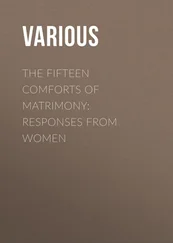Various - Excellent Women
Здесь есть возможность читать онлайн «Various - Excellent Women» — ознакомительный отрывок электронной книги совершенно бесплатно, а после прочтения отрывка купить полную версию. В некоторых случаях можно слушать аудио, скачать через торрент в формате fb2 и присутствует краткое содержание. Жанр: Биографии и Мемуары, foreign_antique, на английском языке. Описание произведения, (предисловие) а так же отзывы посетителей доступны на портале библиотеки ЛибКат.
- Название:Excellent Women
- Автор:
- Жанр:
- Год:неизвестен
- ISBN:нет данных
- Рейтинг книги:5 / 5. Голосов: 1
-
Избранное:Добавить в избранное
- Отзывы:
-
Ваша оценка:
- 100
- 1
- 2
- 3
- 4
- 5
Excellent Women: краткое содержание, описание и аннотация
Предлагаем к чтению аннотацию, описание, краткое содержание или предисловие (зависит от того, что написал сам автор книги «Excellent Women»). Если вы не нашли необходимую информацию о книге — напишите в комментариях, мы постараемся отыскать её.
Excellent Women — читать онлайн ознакомительный отрывок
Ниже представлен текст книги, разбитый по страницам. Система сохранения места последней прочитанной страницы, позволяет с удобством читать онлайн бесплатно книгу «Excellent Women», без необходимости каждый раз заново искать на чём Вы остановились. Поставьте закладку, и сможете в любой момент перейти на страницу, на которой закончили чтение.
Интервал:
Закладка:
IX.
FIRST SIGHT OF NEWGATE PRISON
It was in 1813 that the attention of Elizabeth Fry was first directed to the condition of female prisoners in Newgate. At the beginning of that year four members of the Society of Friends had visited some persons about to be executed. One of the visitors, William Forster, asked Mrs. Fry if nothing could be done to alleviate the sufferings of the women, then living in the most miserable condition. The state of the prison was at that time disgraceful to a civilised country, even after all John Howard's labours. There were about three hundred women, with many children, crowded in four small rooms, badly lighted, badly ventilated, and with no bedding or furniture. They slept on the floor, some of the boards of which were partially raised, to supply a sort of pillow for rest; and here, in rags and dirt, the poor creatures cooked, washed, and lived. Prisoners, tried and untried, misdemeanants and felons, young and old, were huddled together, without any attempt at classification, and without any employment, and with no other superintendence than was given by one man and his son, who had charge of them by night and by day. When strangers appeared amongst them, there was an outburst of clamorous begging, and any money given went at once to purchase drink from a regular tap in the prison. There was no discipline of any sort, and very little restraint over their communication with the outside world, beyond what was necessary for safe custody. Oaths and bad language assailed the ear, and every imaginable horror distressed the eye of a stranger admitted to this pandemonium. Although military sentinels were posted on the roof of the prison, such was the lawlessness prevailing, that even the governor dreaded having to go to the female prisoners' quarters.
Into this scene, accompanied only by Anna Buxton, did Elizabeth Fry enter. Nothing was at the first visit done but giving warm clothing to the most destitute; William Forster having told of the wretchedness caused by the severity of the cold that January of 1813. What was then witnessed of the sad and neglected condition of these women and children sank deeply into the heart of the visitors, and Mrs. Fry formed the resolution to devote herself, as soon as circumstances permitted, to the work of prison reform, and improvement of the condition of female prisoners.
The work was not wholly new to her. When not sixteen years of age, she was deeply interested in the House of Correction in Norwich, and by her repeated and earnest persuasion she induced her father to allow her to visit it. She never forgot her experience there, and she afterwards said that it laid the foundation of her future greater work.
Several years were yet to elapse before the time came for taking up seriously the cause of prisons. These years were crowded with events of various kinds, both in the great world and in the little world of her own family circle. These events caused delays which we must suppose were needed for preparing more perfectly the instrument to be used in the great work. Every interval of time, amidst these years of busy and disturbed life, was occupied in some active and necessary work. There were meetings at various places, Westminster, Norwich, and also at Plaistow, after the removal to Plashet brought the family within its sphere. At most of the meetings she took part, both in the worship and in visiting the poor or the sick. Then there were family cares, troubles, and bereavements. The loss of little Elizabeth, the seventh child, was a sore trial, a child of much promise, and with wisdom and goodness beyond her years, early called to a heavenly home.
Her tenth child was born on the 18th of April, 1816, for whom she thus prayed with thanksgiving—"Be Thou pleased, O Lord God Almighty, yet to look down upon us, and bless us; and if Thou seest meet, to bless our loved infant, to visit it by Thy grace and Thy love; that it may be Thine in time, and Thine to all eternity. We desire to thank Thee for the precious gift."
After a visit to Norfolk, in consequence of the death of the only surviving son of her uncle Joseph Gurney; and to North Runcton, where her elder daughters were residing; and having placed her sons at school, she came to London, to commence the great work to which she now felt she must devote her life.
X.
PRISON WORK
Three years had passed since the first visit to Newgate in 1813. The determination then formed to devote her life to prison-work had been cherished ever since, though hindrances delayed the carrying out of her purpose. Nothing but the constraining love of Christ could have thus induced a woman of Elizabeth Fry's position and character, a woman delicate and in feeble health, to devote herself to labours so arduous and painful, sacrificing personal ease and domestic comfort, for the sake of rescuing from destruction those who were sunk in vice and in wretchedness. But she was following the example of Him who came to seek and to save the lost. Her labour was not in vain in the Lord, for she succeeded not only in greatly lessening the sum of human misery, but was enabled to bring many to the knowledge and the love of the Saviour.
In the years of preparation for her work, she made herself acquainted with what had been done by others. At the suggestion of her brother-in-law, the late Samuel Hoare, she accompanied him to Coldbath Fields House of Correction, the neglected state of which much shocked him. She had also visited different prisons with another brother-in-law, the late Sir Thomas Fowell Buxton, at that time occupied, with other philanthropists, in forming a Society for reformation of juvenile criminals. The interest was thus kept alive in her mind about the women in Newgate, whom she again went to see about the end of 1816. On this her second visit she asked permission to be left alone among the women for some hours. As they flocked round her, she spoke to those who were mothers, of the miserable state of their children, dirty and almost naked, pining for want of proper food, air, and exercise. She said she would like to get a school for the children, to which they gladly assented. Then, after talking kindly to many of the women, she read to them aloud the parable of the Lord of the vineyard, in the 20th chapter of Matthew, making a few simple comments about Christ coming, and being ready to save sinners even at the eleventh hour, so wonderful was His pity and mercy. A few of the listeners asked who Jesus Christ was, so ignorant they were; others feared that their time of salvation was passed.
About the school, she said she would do all she could to help them, and get others to assist; only without their own help she could not undertake anything. She told them to think and to talk over her plan for the school, and left it to them to select a teacher or governess from among themselves. On her next visit they had chosen as schoolmistress a young woman, Mary Connor, recently committed for stealing a watch. An unoccupied cell was given to her as the schoolroom by the governor of the prison. On the next day, Mrs. Fry with a friend, Mary Sanderson (afterwards the wife of Sylvanus Fox), went to open the school. It was intended for children and young women under twenty-five, for from the small size of the room they were obliged to refuse admission to many older women who earnestly sought to share in the instruction.
The poor schoolmistress, Mary Connor, proved well qualified for her duties. She taught with the utmost carefulness and patience, and Mrs. Fry had the satisfaction of seeing her become one of the first-fruits of her Christian labour in the prison. A free pardon was granted to her about fifteen months afterwards; but it proved an unavailing gift, for a cough, which had attacked her some time before, ended in consumption. She displayed, during her illness, much penitence and true faith, and she died with a good hope of pardon through her Saviour.
Читать дальшеИнтервал:
Закладка:
Похожие книги на «Excellent Women»
Представляем Вашему вниманию похожие книги на «Excellent Women» списком для выбора. Мы отобрали схожую по названию и смыслу литературу в надежде предоставить читателям больше вариантов отыскать новые, интересные, ещё непрочитанные произведения.
Обсуждение, отзывы о книге «Excellent Women» и просто собственные мнения читателей. Оставьте ваши комментарии, напишите, что Вы думаете о произведении, его смысле или главных героях. Укажите что конкретно понравилось, а что нет, и почему Вы так считаете.












